Critical Analysis of the Role of Nurse Practitioner in Healthcare
VerifiedAdded on 2022/12/29
|11
|3180
|53
Report
AI Summary
This report provides a critical analysis of the Nurse Practitioner role, focusing on their significance in healthcare, particularly within the context of Westmead Hospital in Australia. The report begins by defining the role of a Nurse Practitioner, emphasizing their advanced education, clinical expertise, and responsibilities in providing comprehensive patient care. It then delves into the specific duties and functions of Nurse Practitioners, including diagnosing illnesses, prescribing treatments, and educating patients on preventive care. The report also examines the registration standards for Nurse Practitioners in Australia, as regulated by the NMBA, including English language skills, criminal history checks, and continuing professional development. Furthermore, it explores the various practice domains of Nurse Practitioners, such as direct comprehensive care, system support, and research. Finally, the report critically analyzes the overall impact of Nurse Practitioners on healthcare delivery, highlighting their role in improving patient outcomes and increasing access to care. This report, contributed by a student, is available on Desklib, a platform offering AI-powered study tools and resources for students.
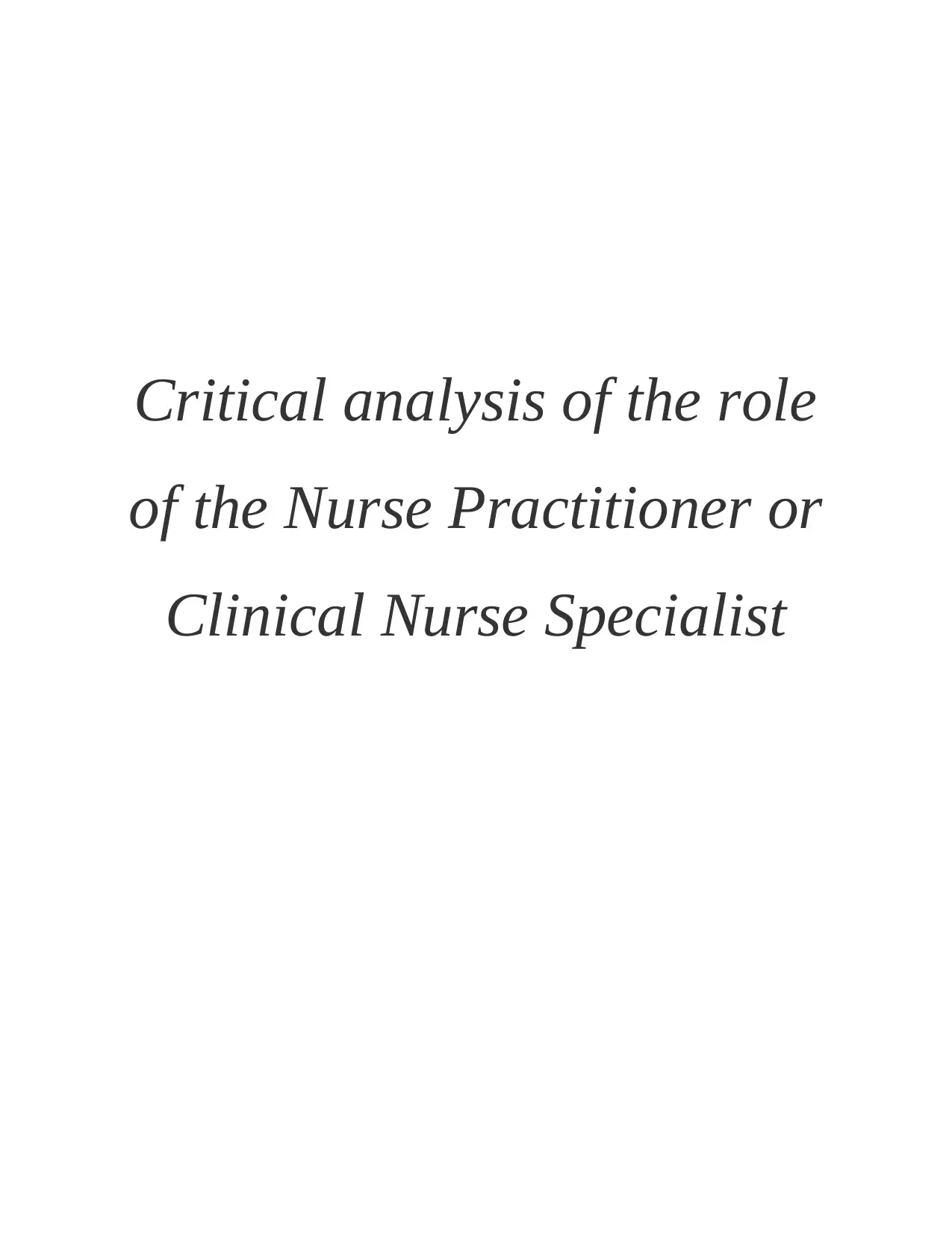
Critical analysis of the role
of the Nurse Practitioner or
Clinical Nurse Specialist
of the Nurse Practitioner or
Clinical Nurse Specialist
Paraphrase This Document
Need a fresh take? Get an instant paraphrase of this document with our AI Paraphraser
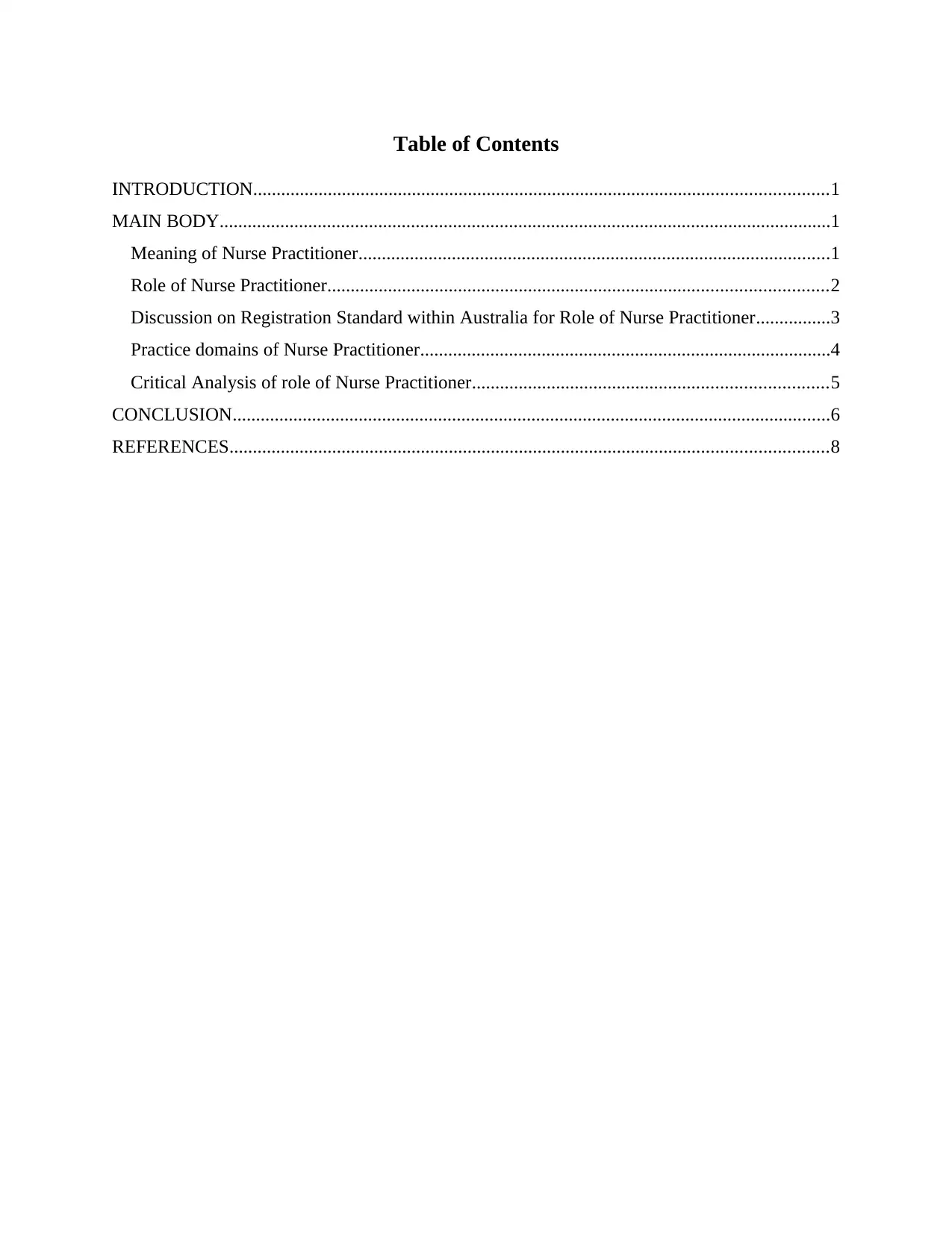
Table of Contents
INTRODUCTION...........................................................................................................................1
MAIN BODY...................................................................................................................................1
Meaning of Nurse Practitioner.....................................................................................................1
Role of Nurse Practitioner...........................................................................................................2
Discussion on Registration Standard within Australia for Role of Nurse Practitioner................3
Practice domains of Nurse Practitioner........................................................................................4
Critical Analysis of role of Nurse Practitioner............................................................................5
CONCLUSION................................................................................................................................6
REFERENCES................................................................................................................................8
INTRODUCTION...........................................................................................................................1
MAIN BODY...................................................................................................................................1
Meaning of Nurse Practitioner.....................................................................................................1
Role of Nurse Practitioner...........................................................................................................2
Discussion on Registration Standard within Australia for Role of Nurse Practitioner................3
Practice domains of Nurse Practitioner........................................................................................4
Critical Analysis of role of Nurse Practitioner............................................................................5
CONCLUSION................................................................................................................................6
REFERENCES................................................................................................................................8

⊘ This is a preview!⊘
Do you want full access?
Subscribe today to unlock all pages.

Trusted by 1+ million students worldwide
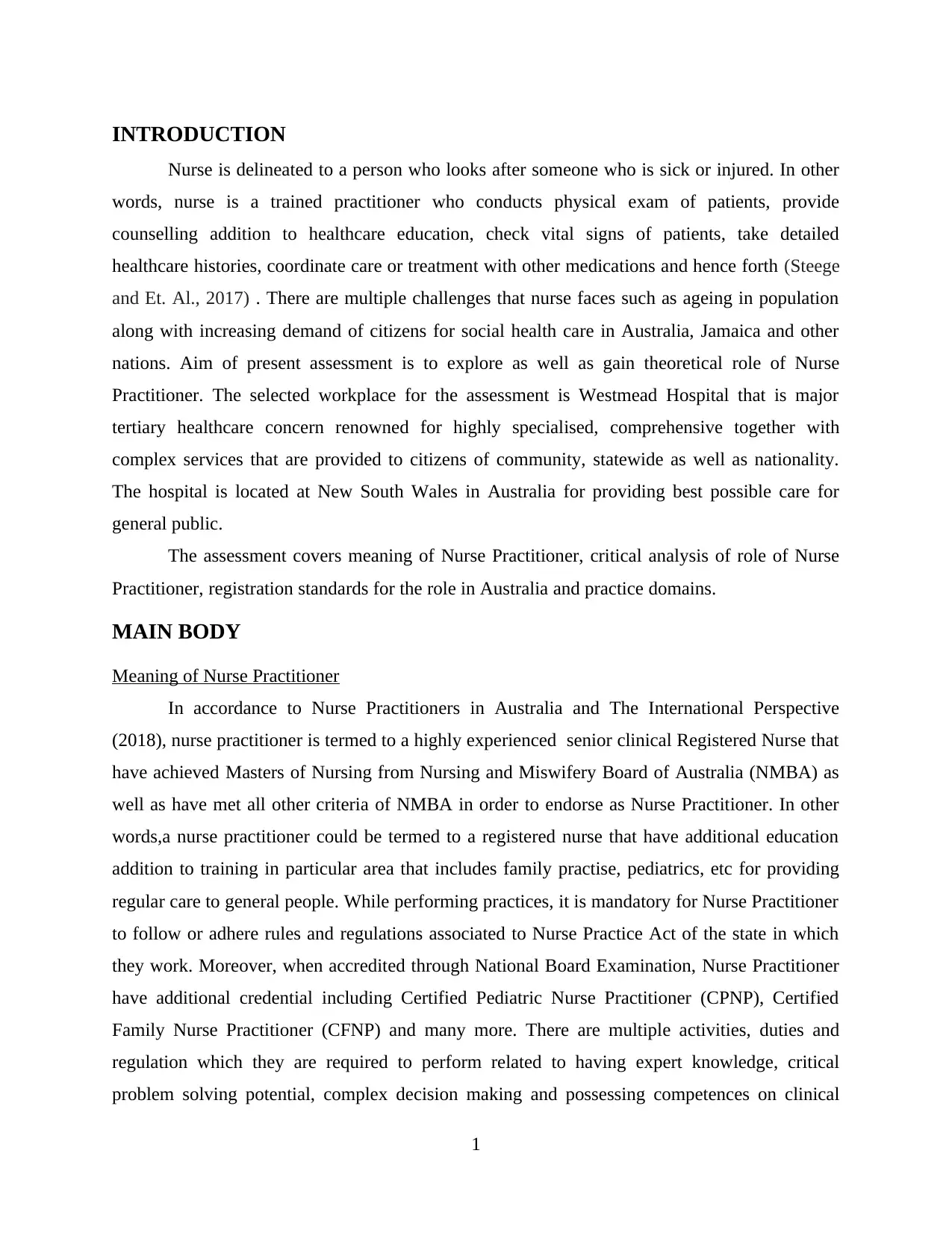
INTRODUCTION
Nurse is delineated to a person who looks after someone who is sick or injured. In other
words, nurse is a trained practitioner who conducts physical exam of patients, provide
counselling addition to healthcare education, check vital signs of patients, take detailed
healthcare histories, coordinate care or treatment with other medications and hence forth (Steege
and Et. Al., 2017) . There are multiple challenges that nurse faces such as ageing in population
along with increasing demand of citizens for social health care in Australia, Jamaica and other
nations. Aim of present assessment is to explore as well as gain theoretical role of Nurse
Practitioner. The selected workplace for the assessment is Westmead Hospital that is major
tertiary healthcare concern renowned for highly specialised, comprehensive together with
complex services that are provided to citizens of community, statewide as well as nationality.
The hospital is located at New South Wales in Australia for providing best possible care for
general public.
The assessment covers meaning of Nurse Practitioner, critical analysis of role of Nurse
Practitioner, registration standards for the role in Australia and practice domains.
MAIN BODY
Meaning of Nurse Practitioner
In accordance to Nurse Practitioners in Australia and The International Perspective
(2018), nurse practitioner is termed to a highly experienced senior clinical Registered Nurse that
have achieved Masters of Nursing from Nursing and Miswifery Board of Australia (NMBA) as
well as have met all other criteria of NMBA in order to endorse as Nurse Practitioner. In other
words,a nurse practitioner could be termed to a registered nurse that have additional education
addition to training in particular area that includes family practise, pediatrics, etc for providing
regular care to general people. While performing practices, it is mandatory for Nurse Practitioner
to follow or adhere rules and regulations associated to Nurse Practice Act of the state in which
they work. Moreover, when accredited through National Board Examination, Nurse Practitioner
have additional credential including Certified Pediatric Nurse Practitioner (CPNP), Certified
Family Nurse Practitioner (CFNP) and many more. There are multiple activities, duties and
regulation which they are required to perform related to having expert knowledge, critical
problem solving potential, complex decision making and possessing competences on clinical
1
Nurse is delineated to a person who looks after someone who is sick or injured. In other
words, nurse is a trained practitioner who conducts physical exam of patients, provide
counselling addition to healthcare education, check vital signs of patients, take detailed
healthcare histories, coordinate care or treatment with other medications and hence forth (Steege
and Et. Al., 2017) . There are multiple challenges that nurse faces such as ageing in population
along with increasing demand of citizens for social health care in Australia, Jamaica and other
nations. Aim of present assessment is to explore as well as gain theoretical role of Nurse
Practitioner. The selected workplace for the assessment is Westmead Hospital that is major
tertiary healthcare concern renowned for highly specialised, comprehensive together with
complex services that are provided to citizens of community, statewide as well as nationality.
The hospital is located at New South Wales in Australia for providing best possible care for
general public.
The assessment covers meaning of Nurse Practitioner, critical analysis of role of Nurse
Practitioner, registration standards for the role in Australia and practice domains.
MAIN BODY
Meaning of Nurse Practitioner
In accordance to Nurse Practitioners in Australia and The International Perspective
(2018), nurse practitioner is termed to a highly experienced senior clinical Registered Nurse that
have achieved Masters of Nursing from Nursing and Miswifery Board of Australia (NMBA) as
well as have met all other criteria of NMBA in order to endorse as Nurse Practitioner. In other
words,a nurse practitioner could be termed to a registered nurse that have additional education
addition to training in particular area that includes family practise, pediatrics, etc for providing
regular care to general people. While performing practices, it is mandatory for Nurse Practitioner
to follow or adhere rules and regulations associated to Nurse Practice Act of the state in which
they work. Moreover, when accredited through National Board Examination, Nurse Practitioner
have additional credential including Certified Pediatric Nurse Practitioner (CPNP), Certified
Family Nurse Practitioner (CFNP) and many more. There are multiple activities, duties and
regulation which they are required to perform related to having expert knowledge, critical
problem solving potential, complex decision making and possessing competences on clinical
1
Paraphrase This Document
Need a fresh take? Get an instant paraphrase of this document with our AI Paraphraser
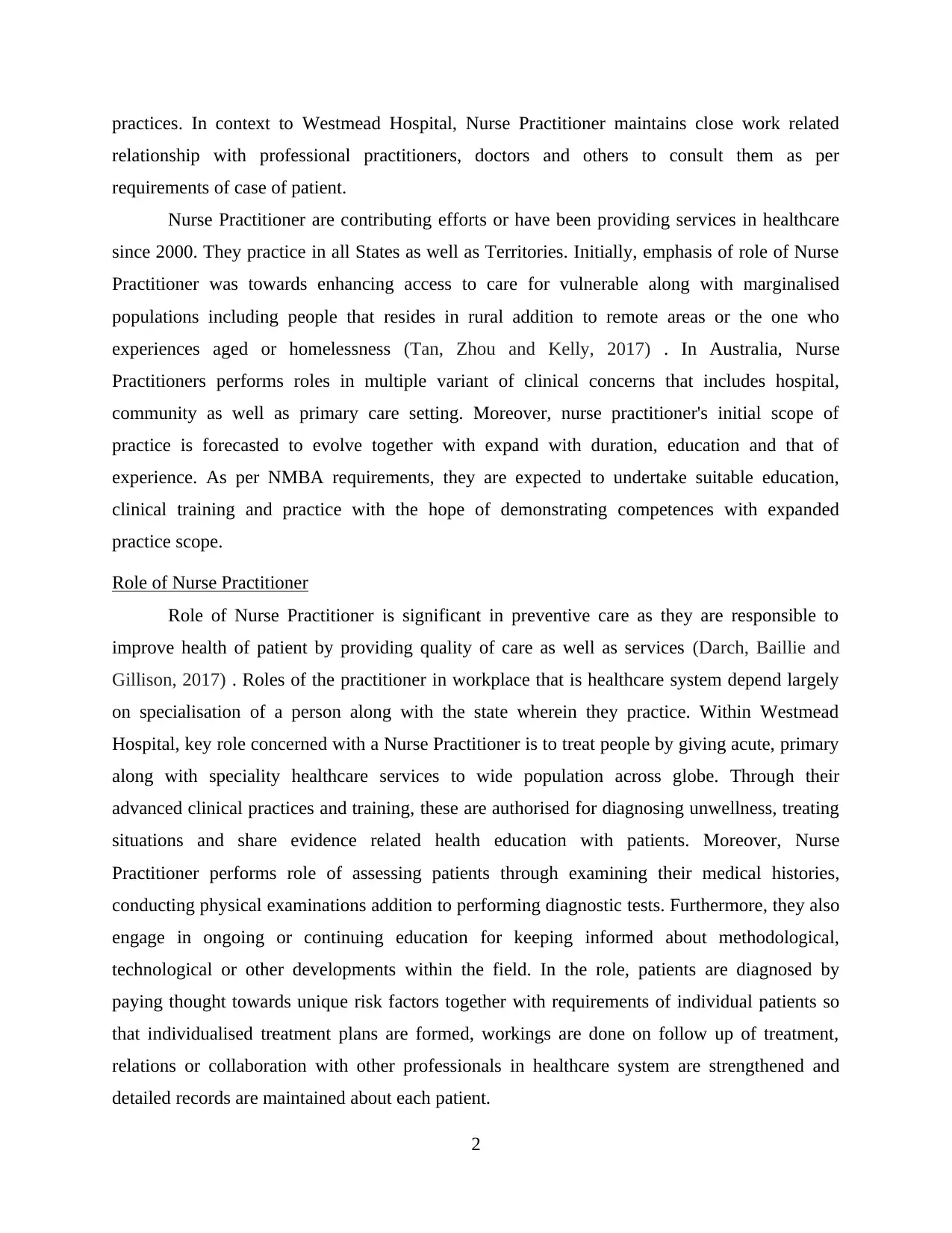
practices. In context to Westmead Hospital, Nurse Practitioner maintains close work related
relationship with professional practitioners, doctors and others to consult them as per
requirements of case of patient.
Nurse Practitioner are contributing efforts or have been providing services in healthcare
since 2000. They practice in all States as well as Territories. Initially, emphasis of role of Nurse
Practitioner was towards enhancing access to care for vulnerable along with marginalised
populations including people that resides in rural addition to remote areas or the one who
experiences aged or homelessness (Tan, Zhou and Kelly, 2017) . In Australia, Nurse
Practitioners performs roles in multiple variant of clinical concerns that includes hospital,
community as well as primary care setting. Moreover, nurse practitioner's initial scope of
practice is forecasted to evolve together with expand with duration, education and that of
experience. As per NMBA requirements, they are expected to undertake suitable education,
clinical training and practice with the hope of demonstrating competences with expanded
practice scope.
Role of Nurse Practitioner
Role of Nurse Practitioner is significant in preventive care as they are responsible to
improve health of patient by providing quality of care as well as services (Darch, Baillie and
Gillison, 2017) . Roles of the practitioner in workplace that is healthcare system depend largely
on specialisation of a person along with the state wherein they practice. Within Westmead
Hospital, key role concerned with a Nurse Practitioner is to treat people by giving acute, primary
along with speciality healthcare services to wide population across globe. Through their
advanced clinical practices and training, these are authorised for diagnosing unwellness, treating
situations and share evidence related health education with patients. Moreover, Nurse
Practitioner performs role of assessing patients through examining their medical histories,
conducting physical examinations addition to performing diagnostic tests. Furthermore, they also
engage in ongoing or continuing education for keeping informed about methodological,
technological or other developments within the field. In the role, patients are diagnosed by
paying thought towards unique risk factors together with requirements of individual patients so
that individualised treatment plans are formed, workings are done on follow up of treatment,
relations or collaboration with other professionals in healthcare system are strengthened and
detailed records are maintained about each patient.
2
relationship with professional practitioners, doctors and others to consult them as per
requirements of case of patient.
Nurse Practitioner are contributing efforts or have been providing services in healthcare
since 2000. They practice in all States as well as Territories. Initially, emphasis of role of Nurse
Practitioner was towards enhancing access to care for vulnerable along with marginalised
populations including people that resides in rural addition to remote areas or the one who
experiences aged or homelessness (Tan, Zhou and Kelly, 2017) . In Australia, Nurse
Practitioners performs roles in multiple variant of clinical concerns that includes hospital,
community as well as primary care setting. Moreover, nurse practitioner's initial scope of
practice is forecasted to evolve together with expand with duration, education and that of
experience. As per NMBA requirements, they are expected to undertake suitable education,
clinical training and practice with the hope of demonstrating competences with expanded
practice scope.
Role of Nurse Practitioner
Role of Nurse Practitioner is significant in preventive care as they are responsible to
improve health of patient by providing quality of care as well as services (Darch, Baillie and
Gillison, 2017) . Roles of the practitioner in workplace that is healthcare system depend largely
on specialisation of a person along with the state wherein they practice. Within Westmead
Hospital, key role concerned with a Nurse Practitioner is to treat people by giving acute, primary
along with speciality healthcare services to wide population across globe. Through their
advanced clinical practices and training, these are authorised for diagnosing unwellness, treating
situations and share evidence related health education with patients. Moreover, Nurse
Practitioner performs role of assessing patients through examining their medical histories,
conducting physical examinations addition to performing diagnostic tests. Furthermore, they also
engage in ongoing or continuing education for keeping informed about methodological,
technological or other developments within the field. In the role, patients are diagnosed by
paying thought towards unique risk factors together with requirements of individual patients so
that individualised treatment plans are formed, workings are done on follow up of treatment,
relations or collaboration with other professionals in healthcare system are strengthened and
detailed records are maintained about each patient.
2
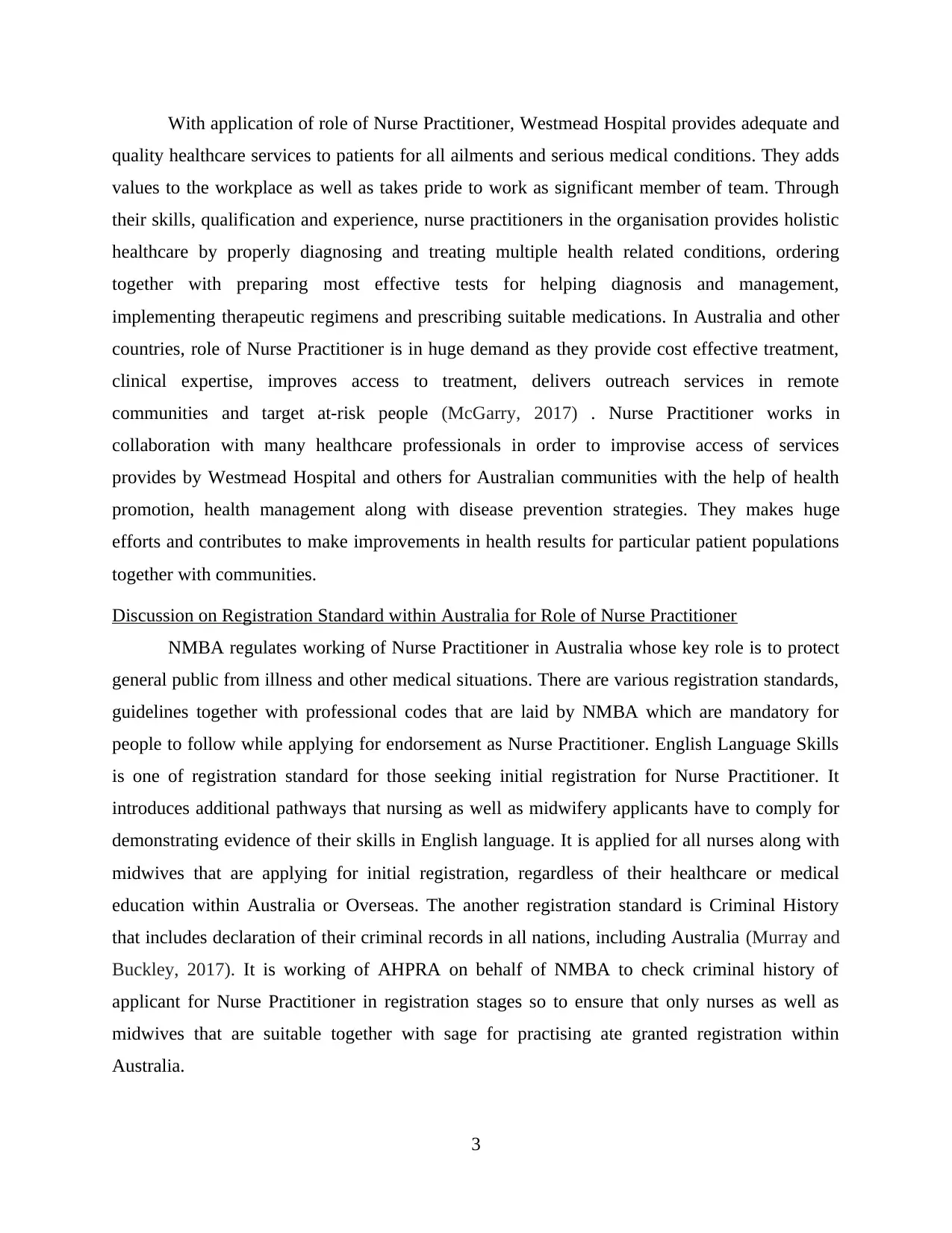
With application of role of Nurse Practitioner, Westmead Hospital provides adequate and
quality healthcare services to patients for all ailments and serious medical conditions. They adds
values to the workplace as well as takes pride to work as significant member of team. Through
their skills, qualification and experience, nurse practitioners in the organisation provides holistic
healthcare by properly diagnosing and treating multiple health related conditions, ordering
together with preparing most effective tests for helping diagnosis and management,
implementing therapeutic regimens and prescribing suitable medications. In Australia and other
countries, role of Nurse Practitioner is in huge demand as they provide cost effective treatment,
clinical expertise, improves access to treatment, delivers outreach services in remote
communities and target at-risk people (McGarry, 2017) . Nurse Practitioner works in
collaboration with many healthcare professionals in order to improvise access of services
provides by Westmead Hospital and others for Australian communities with the help of health
promotion, health management along with disease prevention strategies. They makes huge
efforts and contributes to make improvements in health results for particular patient populations
together with communities.
Discussion on Registration Standard within Australia for Role of Nurse Practitioner
NMBA regulates working of Nurse Practitioner in Australia whose key role is to protect
general public from illness and other medical situations. There are various registration standards,
guidelines together with professional codes that are laid by NMBA which are mandatory for
people to follow while applying for endorsement as Nurse Practitioner. English Language Skills
is one of registration standard for those seeking initial registration for Nurse Practitioner. It
introduces additional pathways that nursing as well as midwifery applicants have to comply for
demonstrating evidence of their skills in English language. It is applied for all nurses along with
midwives that are applying for initial registration, regardless of their healthcare or medical
education within Australia or Overseas. The another registration standard is Criminal History
that includes declaration of their criminal records in all nations, including Australia (Murray and
Buckley, 2017). It is working of AHPRA on behalf of NMBA to check criminal history of
applicant for Nurse Practitioner in registration stages so to ensure that only nurses as well as
midwives that are suitable together with sage for practising ate granted registration within
Australia.
3
quality healthcare services to patients for all ailments and serious medical conditions. They adds
values to the workplace as well as takes pride to work as significant member of team. Through
their skills, qualification and experience, nurse practitioners in the organisation provides holistic
healthcare by properly diagnosing and treating multiple health related conditions, ordering
together with preparing most effective tests for helping diagnosis and management,
implementing therapeutic regimens and prescribing suitable medications. In Australia and other
countries, role of Nurse Practitioner is in huge demand as they provide cost effective treatment,
clinical expertise, improves access to treatment, delivers outreach services in remote
communities and target at-risk people (McGarry, 2017) . Nurse Practitioner works in
collaboration with many healthcare professionals in order to improvise access of services
provides by Westmead Hospital and others for Australian communities with the help of health
promotion, health management along with disease prevention strategies. They makes huge
efforts and contributes to make improvements in health results for particular patient populations
together with communities.
Discussion on Registration Standard within Australia for Role of Nurse Practitioner
NMBA regulates working of Nurse Practitioner in Australia whose key role is to protect
general public from illness and other medical situations. There are various registration standards,
guidelines together with professional codes that are laid by NMBA which are mandatory for
people to follow while applying for endorsement as Nurse Practitioner. English Language Skills
is one of registration standard for those seeking initial registration for Nurse Practitioner. It
introduces additional pathways that nursing as well as midwifery applicants have to comply for
demonstrating evidence of their skills in English language. It is applied for all nurses along with
midwives that are applying for initial registration, regardless of their healthcare or medical
education within Australia or Overseas. The another registration standard is Criminal History
that includes declaration of their criminal records in all nations, including Australia (Murray and
Buckley, 2017). It is working of AHPRA on behalf of NMBA to check criminal history of
applicant for Nurse Practitioner in registration stages so to ensure that only nurses as well as
midwives that are suitable together with sage for practising ate granted registration within
Australia.
3
⊘ This is a preview!⊘
Do you want full access?
Subscribe today to unlock all pages.

Trusted by 1+ million students worldwide
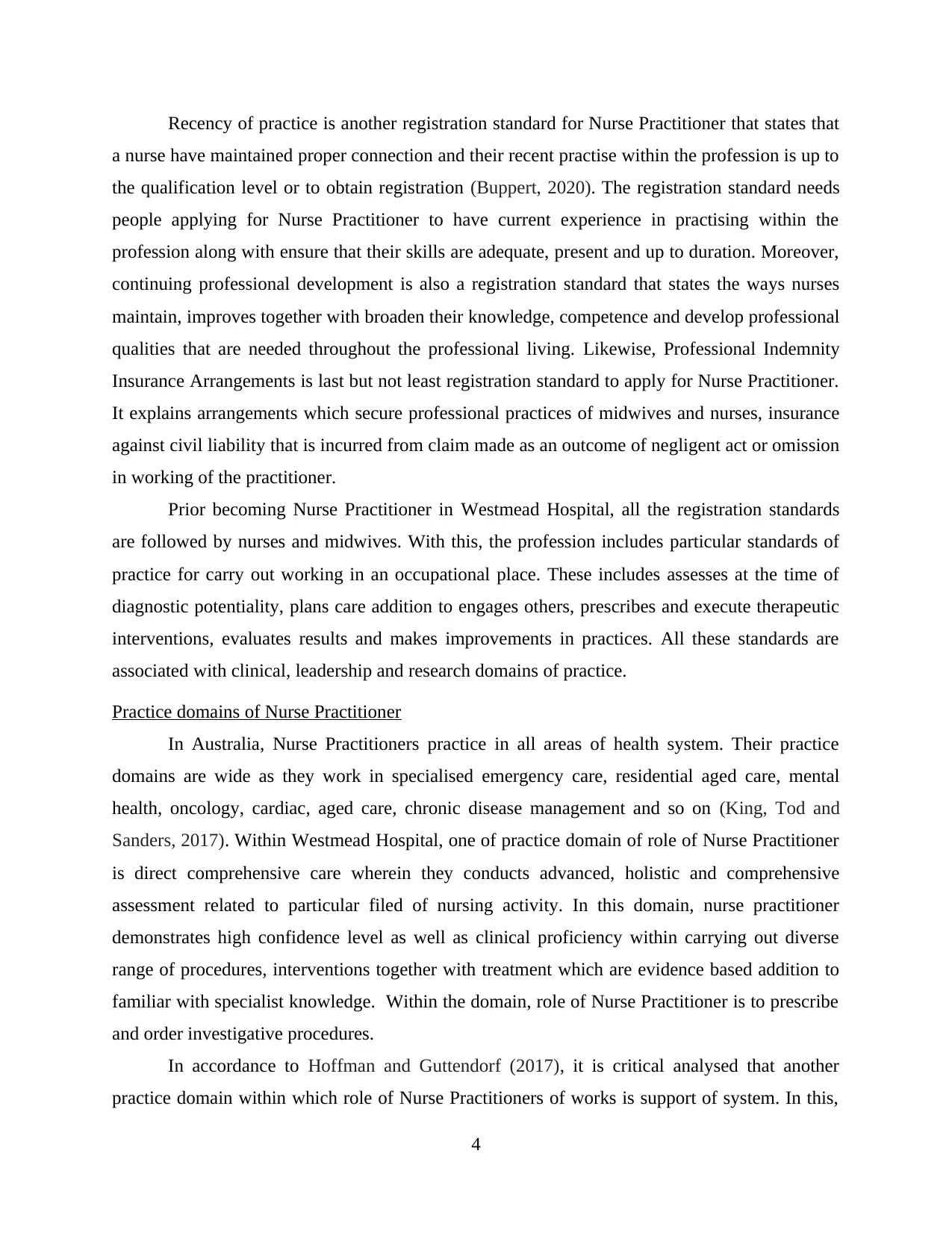
Recency of practice is another registration standard for Nurse Practitioner that states that
a nurse have maintained proper connection and their recent practise within the profession is up to
the qualification level or to obtain registration (Buppert, 2020). The registration standard needs
people applying for Nurse Practitioner to have current experience in practising within the
profession along with ensure that their skills are adequate, present and up to duration. Moreover,
continuing professional development is also a registration standard that states the ways nurses
maintain, improves together with broaden their knowledge, competence and develop professional
qualities that are needed throughout the professional living. Likewise, Professional Indemnity
Insurance Arrangements is last but not least registration standard to apply for Nurse Practitioner.
It explains arrangements which secure professional practices of midwives and nurses, insurance
against civil liability that is incurred from claim made as an outcome of negligent act or omission
in working of the practitioner.
Prior becoming Nurse Practitioner in Westmead Hospital, all the registration standards
are followed by nurses and midwives. With this, the profession includes particular standards of
practice for carry out working in an occupational place. These includes assesses at the time of
diagnostic potentiality, plans care addition to engages others, prescribes and execute therapeutic
interventions, evaluates results and makes improvements in practices. All these standards are
associated with clinical, leadership and research domains of practice.
Practice domains of Nurse Practitioner
In Australia, Nurse Practitioners practice in all areas of health system. Their practice
domains are wide as they work in specialised emergency care, residential aged care, mental
health, oncology, cardiac, aged care, chronic disease management and so on (King, Tod and
Sanders, 2017). Within Westmead Hospital, one of practice domain of role of Nurse Practitioner
is direct comprehensive care wherein they conducts advanced, holistic and comprehensive
assessment related to particular filed of nursing activity. In this domain, nurse practitioner
demonstrates high confidence level as well as clinical proficiency within carrying out diverse
range of procedures, interventions together with treatment which are evidence based addition to
familiar with specialist knowledge. Within the domain, role of Nurse Practitioner is to prescribe
and order investigative procedures.
In accordance to Hoffman and Guttendorf (2017), it is critical analysed that another
practice domain within which role of Nurse Practitioners of works is support of system. In this,
4
a nurse have maintained proper connection and their recent practise within the profession is up to
the qualification level or to obtain registration (Buppert, 2020). The registration standard needs
people applying for Nurse Practitioner to have current experience in practising within the
profession along with ensure that their skills are adequate, present and up to duration. Moreover,
continuing professional development is also a registration standard that states the ways nurses
maintain, improves together with broaden their knowledge, competence and develop professional
qualities that are needed throughout the professional living. Likewise, Professional Indemnity
Insurance Arrangements is last but not least registration standard to apply for Nurse Practitioner.
It explains arrangements which secure professional practices of midwives and nurses, insurance
against civil liability that is incurred from claim made as an outcome of negligent act or omission
in working of the practitioner.
Prior becoming Nurse Practitioner in Westmead Hospital, all the registration standards
are followed by nurses and midwives. With this, the profession includes particular standards of
practice for carry out working in an occupational place. These includes assesses at the time of
diagnostic potentiality, plans care addition to engages others, prescribes and execute therapeutic
interventions, evaluates results and makes improvements in practices. All these standards are
associated with clinical, leadership and research domains of practice.
Practice domains of Nurse Practitioner
In Australia, Nurse Practitioners practice in all areas of health system. Their practice
domains are wide as they work in specialised emergency care, residential aged care, mental
health, oncology, cardiac, aged care, chronic disease management and so on (King, Tod and
Sanders, 2017). Within Westmead Hospital, one of practice domain of role of Nurse Practitioner
is direct comprehensive care wherein they conducts advanced, holistic and comprehensive
assessment related to particular filed of nursing activity. In this domain, nurse practitioner
demonstrates high confidence level as well as clinical proficiency within carrying out diverse
range of procedures, interventions together with treatment which are evidence based addition to
familiar with specialist knowledge. Within the domain, role of Nurse Practitioner is to prescribe
and order investigative procedures.
In accordance to Hoffman and Guttendorf (2017), it is critical analysed that another
practice domain within which role of Nurse Practitioners of works is support of system. In this,
4
Paraphrase This Document
Need a fresh take? Get an instant paraphrase of this document with our AI Paraphraser
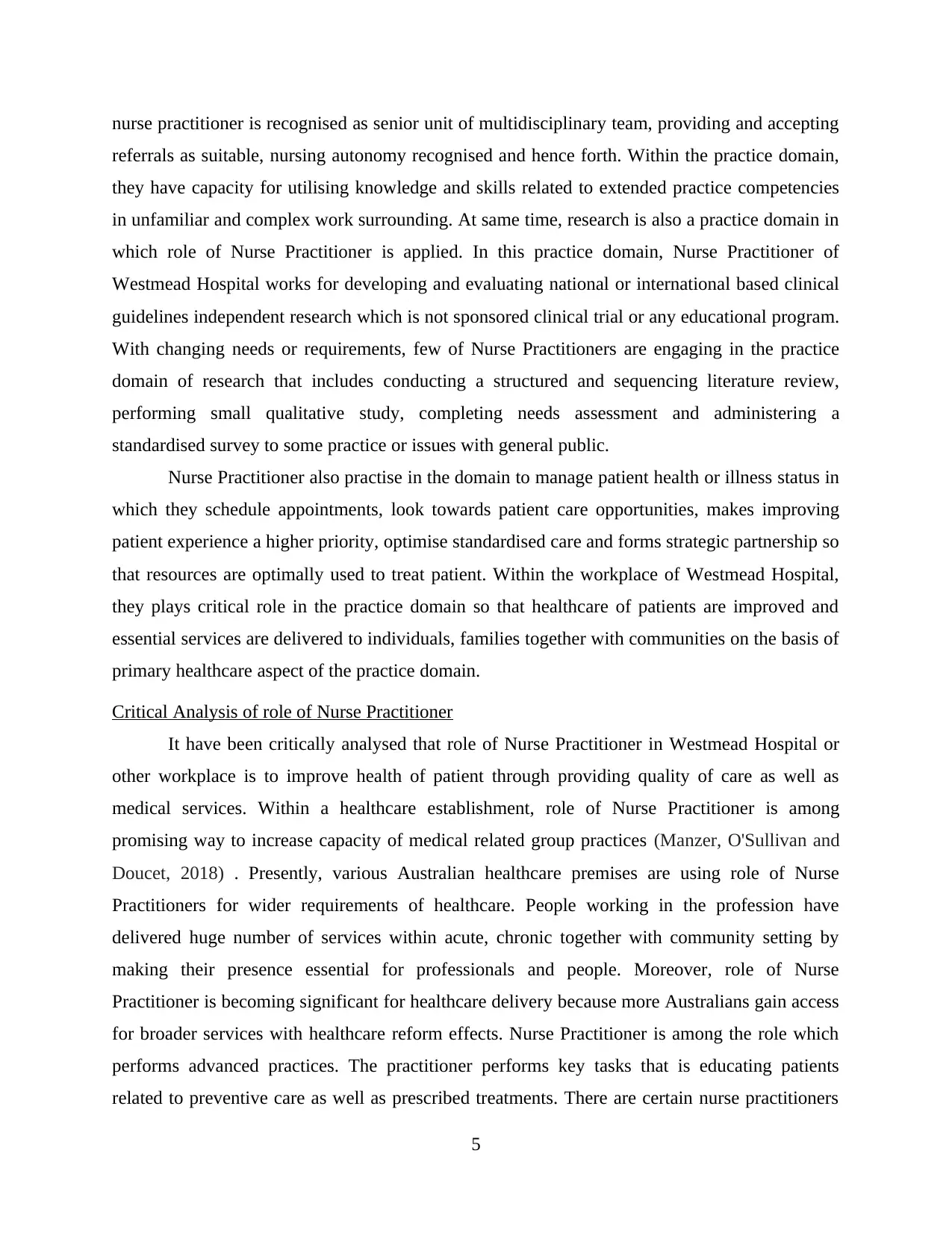
nurse practitioner is recognised as senior unit of multidisciplinary team, providing and accepting
referrals as suitable, nursing autonomy recognised and hence forth. Within the practice domain,
they have capacity for utilising knowledge and skills related to extended practice competencies
in unfamiliar and complex work surrounding. At same time, research is also a practice domain in
which role of Nurse Practitioner is applied. In this practice domain, Nurse Practitioner of
Westmead Hospital works for developing and evaluating national or international based clinical
guidelines independent research which is not sponsored clinical trial or any educational program.
With changing needs or requirements, few of Nurse Practitioners are engaging in the practice
domain of research that includes conducting a structured and sequencing literature review,
performing small qualitative study, completing needs assessment and administering a
standardised survey to some practice or issues with general public.
Nurse Practitioner also practise in the domain to manage patient health or illness status in
which they schedule appointments, look towards patient care opportunities, makes improving
patient experience a higher priority, optimise standardised care and forms strategic partnership so
that resources are optimally used to treat patient. Within the workplace of Westmead Hospital,
they plays critical role in the practice domain so that healthcare of patients are improved and
essential services are delivered to individuals, families together with communities on the basis of
primary healthcare aspect of the practice domain.
Critical Analysis of role of Nurse Practitioner
It have been critically analysed that role of Nurse Practitioner in Westmead Hospital or
other workplace is to improve health of patient through providing quality of care as well as
medical services. Within a healthcare establishment, role of Nurse Practitioner is among
promising way to increase capacity of medical related group practices (Manzer, O'Sullivan and
Doucet, 2018) . Presently, various Australian healthcare premises are using role of Nurse
Practitioners for wider requirements of healthcare. People working in the profession have
delivered huge number of services within acute, chronic together with community setting by
making their presence essential for professionals and people. Moreover, role of Nurse
Practitioner is becoming significant for healthcare delivery because more Australians gain access
for broader services with healthcare reform effects. Nurse Practitioner is among the role which
performs advanced practices. The practitioner performs key tasks that is educating patients
related to preventive care as well as prescribed treatments. There are certain nurse practitioners
5
referrals as suitable, nursing autonomy recognised and hence forth. Within the practice domain,
they have capacity for utilising knowledge and skills related to extended practice competencies
in unfamiliar and complex work surrounding. At same time, research is also a practice domain in
which role of Nurse Practitioner is applied. In this practice domain, Nurse Practitioner of
Westmead Hospital works for developing and evaluating national or international based clinical
guidelines independent research which is not sponsored clinical trial or any educational program.
With changing needs or requirements, few of Nurse Practitioners are engaging in the practice
domain of research that includes conducting a structured and sequencing literature review,
performing small qualitative study, completing needs assessment and administering a
standardised survey to some practice or issues with general public.
Nurse Practitioner also practise in the domain to manage patient health or illness status in
which they schedule appointments, look towards patient care opportunities, makes improving
patient experience a higher priority, optimise standardised care and forms strategic partnership so
that resources are optimally used to treat patient. Within the workplace of Westmead Hospital,
they plays critical role in the practice domain so that healthcare of patients are improved and
essential services are delivered to individuals, families together with communities on the basis of
primary healthcare aspect of the practice domain.
Critical Analysis of role of Nurse Practitioner
It have been critically analysed that role of Nurse Practitioner in Westmead Hospital or
other workplace is to improve health of patient through providing quality of care as well as
medical services. Within a healthcare establishment, role of Nurse Practitioner is among
promising way to increase capacity of medical related group practices (Manzer, O'Sullivan and
Doucet, 2018) . Presently, various Australian healthcare premises are using role of Nurse
Practitioners for wider requirements of healthcare. People working in the profession have
delivered huge number of services within acute, chronic together with community setting by
making their presence essential for professionals and people. Moreover, role of Nurse
Practitioner is becoming significant for healthcare delivery because more Australians gain access
for broader services with healthcare reform effects. Nurse Practitioner is among the role which
performs advanced practices. The practitioner performs key tasks that is educating patients
related to preventive care as well as prescribed treatments. There are certain nurse practitioners
5
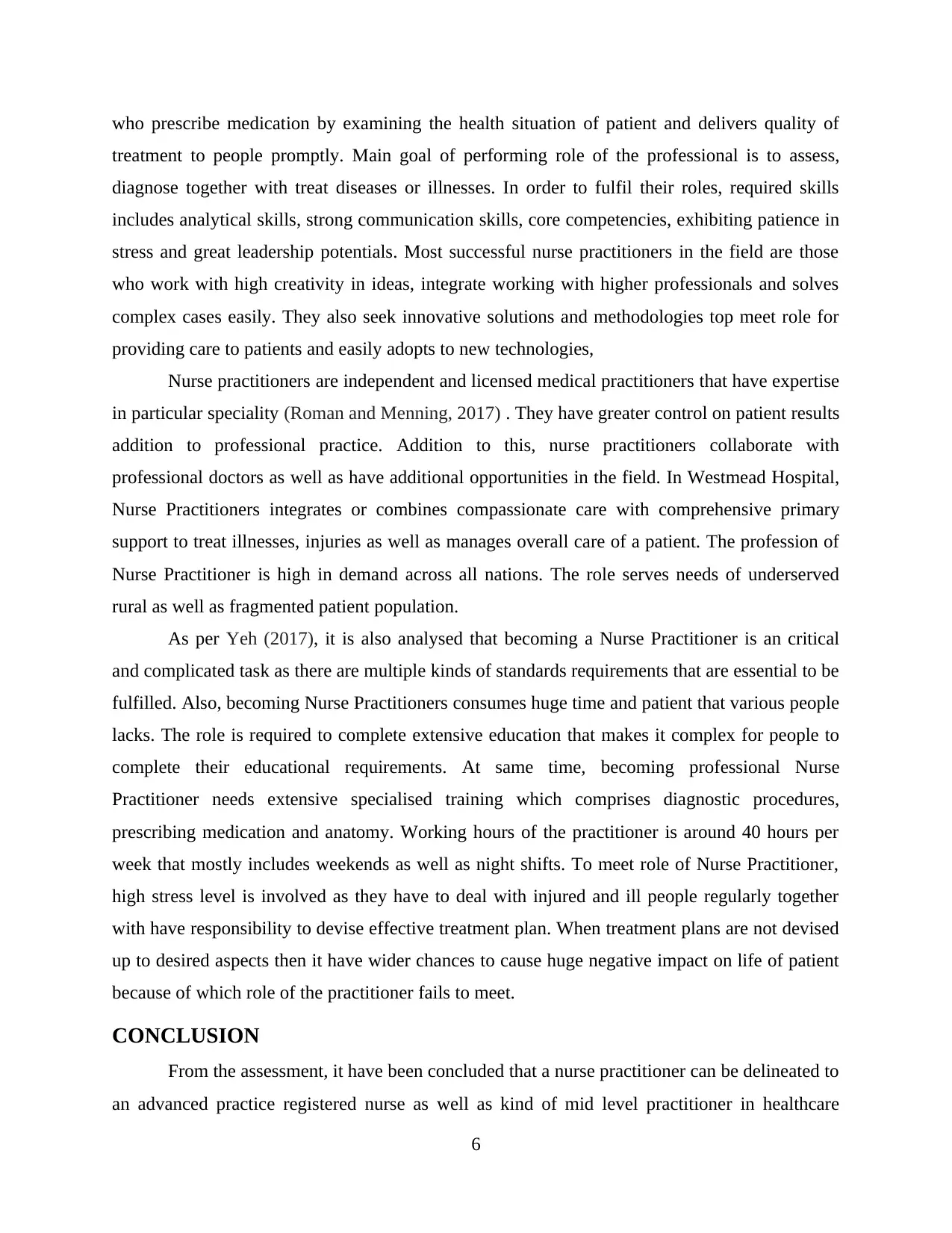
who prescribe medication by examining the health situation of patient and delivers quality of
treatment to people promptly. Main goal of performing role of the professional is to assess,
diagnose together with treat diseases or illnesses. In order to fulfil their roles, required skills
includes analytical skills, strong communication skills, core competencies, exhibiting patience in
stress and great leadership potentials. Most successful nurse practitioners in the field are those
who work with high creativity in ideas, integrate working with higher professionals and solves
complex cases easily. They also seek innovative solutions and methodologies top meet role for
providing care to patients and easily adopts to new technologies,
Nurse practitioners are independent and licensed medical practitioners that have expertise
in particular speciality (Roman and Menning, 2017) . They have greater control on patient results
addition to professional practice. Addition to this, nurse practitioners collaborate with
professional doctors as well as have additional opportunities in the field. In Westmead Hospital,
Nurse Practitioners integrates or combines compassionate care with comprehensive primary
support to treat illnesses, injuries as well as manages overall care of a patient. The profession of
Nurse Practitioner is high in demand across all nations. The role serves needs of underserved
rural as well as fragmented patient population.
As per Yeh (2017), it is also analysed that becoming a Nurse Practitioner is an critical
and complicated task as there are multiple kinds of standards requirements that are essential to be
fulfilled. Also, becoming Nurse Practitioners consumes huge time and patient that various people
lacks. The role is required to complete extensive education that makes it complex for people to
complete their educational requirements. At same time, becoming professional Nurse
Practitioner needs extensive specialised training which comprises diagnostic procedures,
prescribing medication and anatomy. Working hours of the practitioner is around 40 hours per
week that mostly includes weekends as well as night shifts. To meet role of Nurse Practitioner,
high stress level is involved as they have to deal with injured and ill people regularly together
with have responsibility to devise effective treatment plan. When treatment plans are not devised
up to desired aspects then it have wider chances to cause huge negative impact on life of patient
because of which role of the practitioner fails to meet.
CONCLUSION
From the assessment, it have been concluded that a nurse practitioner can be delineated to
an advanced practice registered nurse as well as kind of mid level practitioner in healthcare
6
treatment to people promptly. Main goal of performing role of the professional is to assess,
diagnose together with treat diseases or illnesses. In order to fulfil their roles, required skills
includes analytical skills, strong communication skills, core competencies, exhibiting patience in
stress and great leadership potentials. Most successful nurse practitioners in the field are those
who work with high creativity in ideas, integrate working with higher professionals and solves
complex cases easily. They also seek innovative solutions and methodologies top meet role for
providing care to patients and easily adopts to new technologies,
Nurse practitioners are independent and licensed medical practitioners that have expertise
in particular speciality (Roman and Menning, 2017) . They have greater control on patient results
addition to professional practice. Addition to this, nurse practitioners collaborate with
professional doctors as well as have additional opportunities in the field. In Westmead Hospital,
Nurse Practitioners integrates or combines compassionate care with comprehensive primary
support to treat illnesses, injuries as well as manages overall care of a patient. The profession of
Nurse Practitioner is high in demand across all nations. The role serves needs of underserved
rural as well as fragmented patient population.
As per Yeh (2017), it is also analysed that becoming a Nurse Practitioner is an critical
and complicated task as there are multiple kinds of standards requirements that are essential to be
fulfilled. Also, becoming Nurse Practitioners consumes huge time and patient that various people
lacks. The role is required to complete extensive education that makes it complex for people to
complete their educational requirements. At same time, becoming professional Nurse
Practitioner needs extensive specialised training which comprises diagnostic procedures,
prescribing medication and anatomy. Working hours of the practitioner is around 40 hours per
week that mostly includes weekends as well as night shifts. To meet role of Nurse Practitioner,
high stress level is involved as they have to deal with injured and ill people regularly together
with have responsibility to devise effective treatment plan. When treatment plans are not devised
up to desired aspects then it have wider chances to cause huge negative impact on life of patient
because of which role of the practitioner fails to meet.
CONCLUSION
From the assessment, it have been concluded that a nurse practitioner can be delineated to
an advanced practice registered nurse as well as kind of mid level practitioner in healthcare
6
⊘ This is a preview!⊘
Do you want full access?
Subscribe today to unlock all pages.

Trusted by 1+ million students worldwide
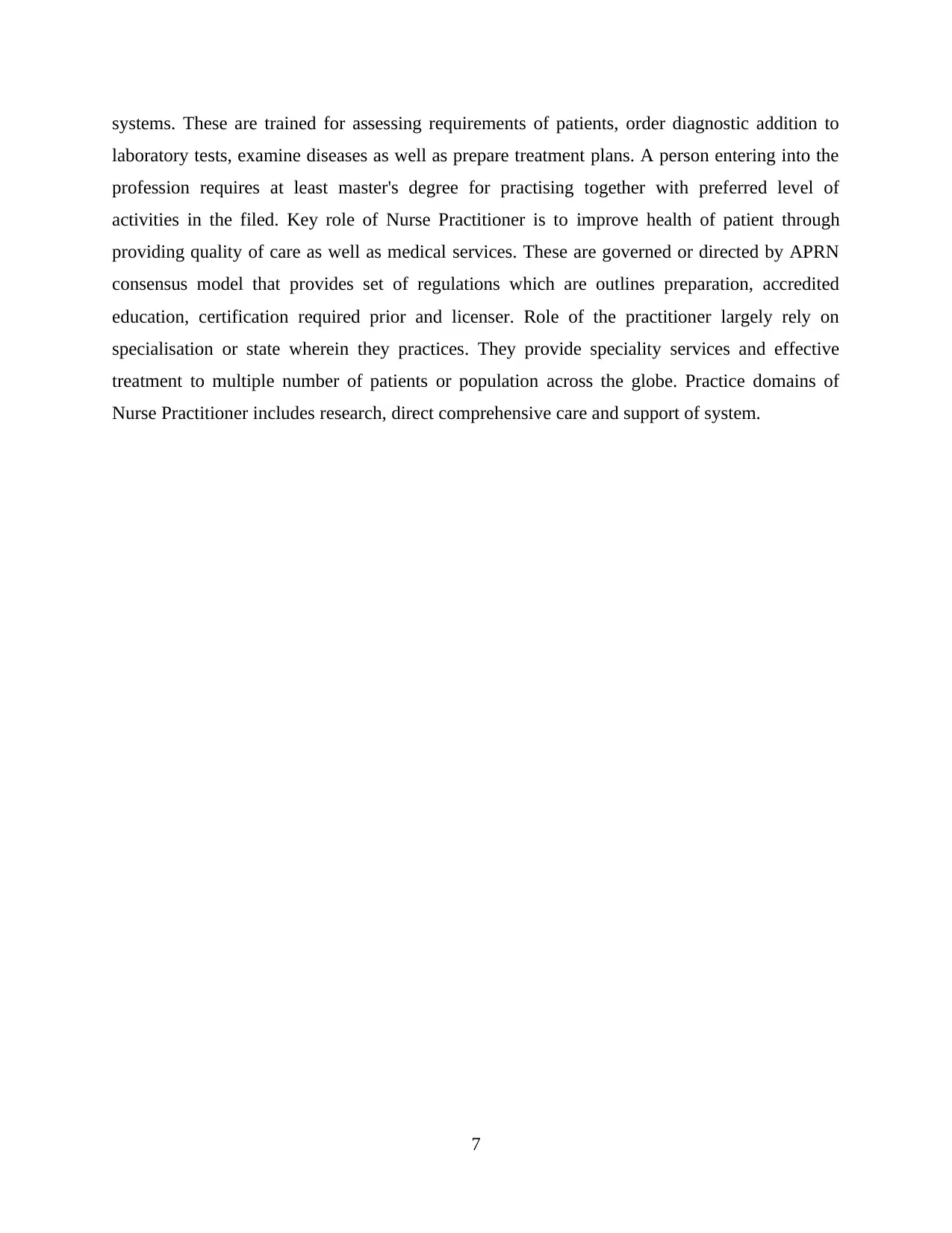
systems. These are trained for assessing requirements of patients, order diagnostic addition to
laboratory tests, examine diseases as well as prepare treatment plans. A person entering into the
profession requires at least master's degree for practising together with preferred level of
activities in the filed. Key role of Nurse Practitioner is to improve health of patient through
providing quality of care as well as medical services. These are governed or directed by APRN
consensus model that provides set of regulations which are outlines preparation, accredited
education, certification required prior and licenser. Role of the practitioner largely rely on
specialisation or state wherein they practices. They provide speciality services and effective
treatment to multiple number of patients or population across the globe. Practice domains of
Nurse Practitioner includes research, direct comprehensive care and support of system.
7
laboratory tests, examine diseases as well as prepare treatment plans. A person entering into the
profession requires at least master's degree for practising together with preferred level of
activities in the filed. Key role of Nurse Practitioner is to improve health of patient through
providing quality of care as well as medical services. These are governed or directed by APRN
consensus model that provides set of regulations which are outlines preparation, accredited
education, certification required prior and licenser. Role of the practitioner largely rely on
specialisation or state wherein they practices. They provide speciality services and effective
treatment to multiple number of patients or population across the globe. Practice domains of
Nurse Practitioner includes research, direct comprehensive care and support of system.
7
Paraphrase This Document
Need a fresh take? Get an instant paraphrase of this document with our AI Paraphraser
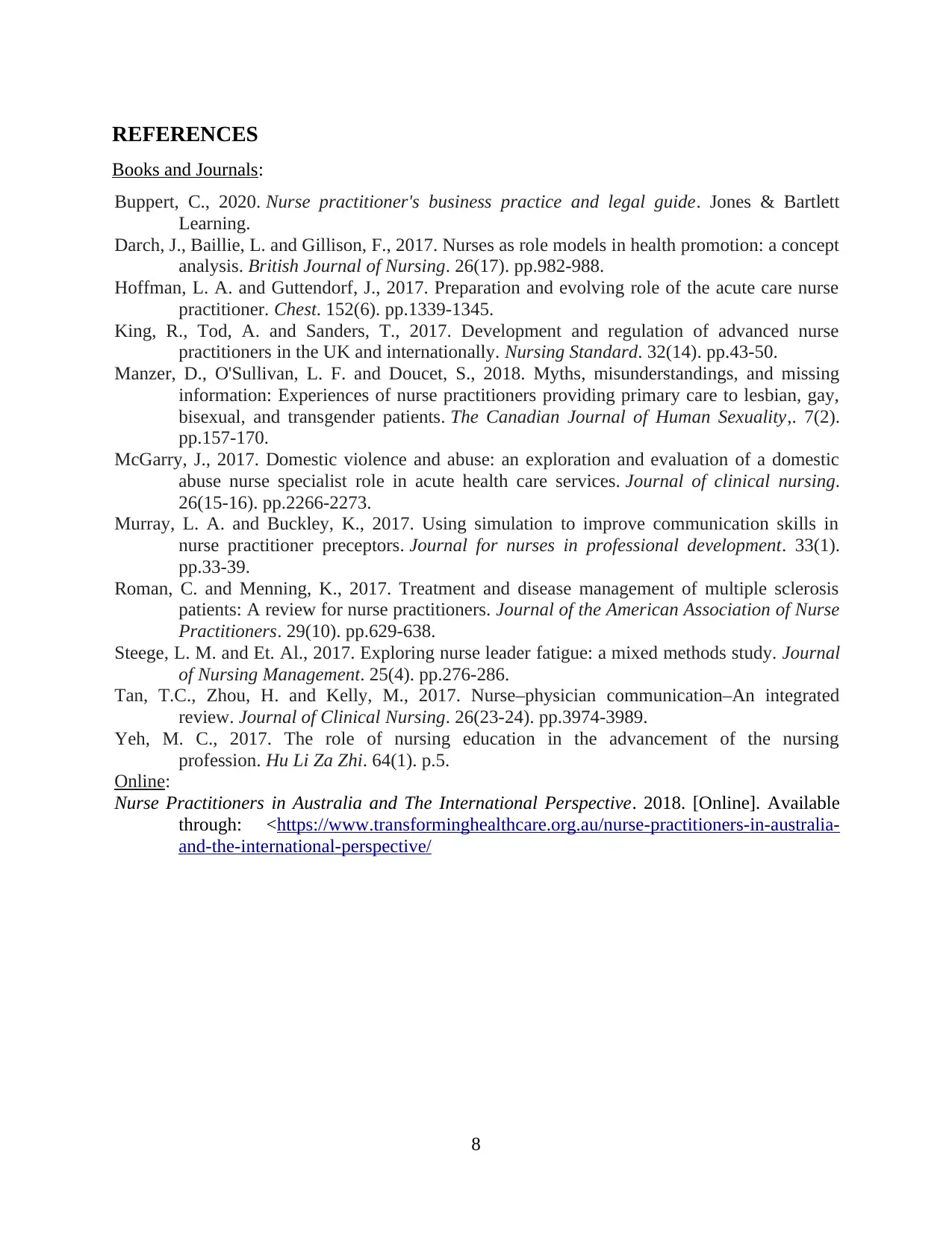
REFERENCES
Books and Journals:
Buppert, C., 2020. Nurse practitioner's business practice and legal guide. Jones & Bartlett
Learning.
Darch, J., Baillie, L. and Gillison, F., 2017. Nurses as role models in health promotion: a concept
analysis. British Journal of Nursing. 26(17). pp.982-988.
Hoffman, L. A. and Guttendorf, J., 2017. Preparation and evolving role of the acute care nurse
practitioner. Chest. 152(6). pp.1339-1345.
King, R., Tod, A. and Sanders, T., 2017. Development and regulation of advanced nurse
practitioners in the UK and internationally. Nursing Standard. 32(14). pp.43-50.
Manzer, D., O'Sullivan, L. F. and Doucet, S., 2018. Myths, misunderstandings, and missing
information: Experiences of nurse practitioners providing primary care to lesbian, gay,
bisexual, and transgender patients. The Canadian Journal of Human Sexuality,. 7(2).
pp.157-170.
McGarry, J., 2017. Domestic violence and abuse: an exploration and evaluation of a domestic
abuse nurse specialist role in acute health care services. Journal of clinical nursing.
26(15-16). pp.2266-2273.
Murray, L. A. and Buckley, K., 2017. Using simulation to improve communication skills in
nurse practitioner preceptors. Journal for nurses in professional development. 33(1).
pp.33-39.
Roman, C. and Menning, K., 2017. Treatment and disease management of multiple sclerosis
patients: A review for nurse practitioners. Journal of the American Association of Nurse
Practitioners. 29(10). pp.629-638.
Steege, L. M. and Et. Al., 2017. Exploring nurse leader fatigue: a mixed methods study. Journal
of Nursing Management. 25(4). pp.276-286.
Tan, T.C., Zhou, H. and Kelly, M., 2017. Nurse–physician communication–An integrated
review. Journal of Clinical Nursing. 26(23-24). pp.3974-3989.
Yeh, M. C., 2017. The role of nursing education in the advancement of the nursing
profession. Hu Li Za Zhi. 64(1). p.5.
Online:
Nurse Practitioners in Australia and The International Perspective. 2018. [Online]. Available
through: <https://www.transforminghealthcare.org.au/nurse-practitioners-in-australia-
and-the-international-perspective/
8
Books and Journals:
Buppert, C., 2020. Nurse practitioner's business practice and legal guide. Jones & Bartlett
Learning.
Darch, J., Baillie, L. and Gillison, F., 2017. Nurses as role models in health promotion: a concept
analysis. British Journal of Nursing. 26(17). pp.982-988.
Hoffman, L. A. and Guttendorf, J., 2017. Preparation and evolving role of the acute care nurse
practitioner. Chest. 152(6). pp.1339-1345.
King, R., Tod, A. and Sanders, T., 2017. Development and regulation of advanced nurse
practitioners in the UK and internationally. Nursing Standard. 32(14). pp.43-50.
Manzer, D., O'Sullivan, L. F. and Doucet, S., 2018. Myths, misunderstandings, and missing
information: Experiences of nurse practitioners providing primary care to lesbian, gay,
bisexual, and transgender patients. The Canadian Journal of Human Sexuality,. 7(2).
pp.157-170.
McGarry, J., 2017. Domestic violence and abuse: an exploration and evaluation of a domestic
abuse nurse specialist role in acute health care services. Journal of clinical nursing.
26(15-16). pp.2266-2273.
Murray, L. A. and Buckley, K., 2017. Using simulation to improve communication skills in
nurse practitioner preceptors. Journal for nurses in professional development. 33(1).
pp.33-39.
Roman, C. and Menning, K., 2017. Treatment and disease management of multiple sclerosis
patients: A review for nurse practitioners. Journal of the American Association of Nurse
Practitioners. 29(10). pp.629-638.
Steege, L. M. and Et. Al., 2017. Exploring nurse leader fatigue: a mixed methods study. Journal
of Nursing Management. 25(4). pp.276-286.
Tan, T.C., Zhou, H. and Kelly, M., 2017. Nurse–physician communication–An integrated
review. Journal of Clinical Nursing. 26(23-24). pp.3974-3989.
Yeh, M. C., 2017. The role of nursing education in the advancement of the nursing
profession. Hu Li Za Zhi. 64(1). p.5.
Online:
Nurse Practitioners in Australia and The International Perspective. 2018. [Online]. Available
through: <https://www.transforminghealthcare.org.au/nurse-practitioners-in-australia-
and-the-international-perspective/
8
1 out of 11
Related Documents
Your All-in-One AI-Powered Toolkit for Academic Success.
+13062052269
info@desklib.com
Available 24*7 on WhatsApp / Email
![[object Object]](/_next/static/media/star-bottom.7253800d.svg)
Unlock your academic potential
Copyright © 2020–2026 A2Z Services. All Rights Reserved. Developed and managed by ZUCOL.





